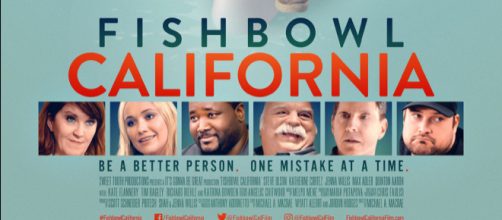“Fishbowl California” is a movie that seamlessly blends comedy with drama. It tells the story of a constant underachiever named Rodney who meets, by chance, a tough-talking widow named June (Katherine Cortez). Ultimately, June helps Rodney get his life back on track and Rodney (Steve Olson) helps June overcome her lingering depression over the death of her husband and regain her will to live.
Comedy, characters, and performances
“Fishbowl California” initially premiered at the Columbus Film Festival in Ohio. The touching mix of quirky comedy and heartfelt character study gained the film acclaim by critics and booming applause from the audience.
With co-stars like Tim Bagley (famed for his hilarious role as the princess-loving and effeminate principle in “Teachers”) playing the endlessly nosy—yet earnest—neighbor, “Fishbowl California” has some moments that truly shine (such as Tim Bagley’s genuine concern for June’s neglected and parched flowers).
Director Michael A. MacRae did a laudable job shooting this feature, which was his directorial debut, yet the movie’s real strengths lie in its revelation of the characters' vulnerabilities--and stealth--as they combat their own personal demons and find strength in one another. The excellence of the performances—especially that of Katherine Cortez, who is nothing short of stellar—and the reality-based vibe give this slice-of-life film a truly realistic edge.
A lot of attention was paid to small yet important details which are often absent from the film. In many Movies, characters drive luxury cars and live in mansions…in this case, Rodney’s car is constantly breaking down, June dresses shabbily (a common symptom and/or effect of depression) and it is clear that June’s home, while cozy, lies far removed from the glitz of Rodeo Drive.
In fact, from the look of the liquor store that she frequents (and, as it turns out, owns), it seems as if the characters dwell on the solidly working-class side of town where money is a constant source of concern…something that vast majority of Americans can relate to.
Backstories, realism, and film
The characters in "Fishbowl California" are also achingly human with multilayered personalities and nuanced backstories that are revealed without being overtly explored.
June drinks and appears to be depressed (even suicidal) under her tough demeanor.
It turns out that her sadness stems from missing her husband and her own ailing health coupled with the absence of her genuinely caring daughter (seemingly an only child), a hardworking nurse who--try as she might--cannot make time to check in on her mother daily.
Rodney mentions that he grew up in the foster system, has trouble finding (let alone hold down) a job, and cannot even properly care for his pet goldfish (“Sushi” who, animal lovers should be warned, meets an unfortunate off-screen fate), something which drives his girlfriend into the arms of another man.
Although the movie ends on an ultimately happy note, not every issue is automatically resolved, and the viewers are left thinking about the characters after the credits roll.
This is yet another hark-back to the realism of the film which captures the often untidy, and even mundane, aspects of daily life that can have huge effects on how people behave.
“Fishbowl California” is available on VOD, iTunes, and Amazon. If you like kindhearted comedies, then this is a movie for you.


